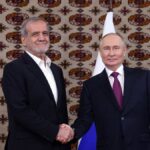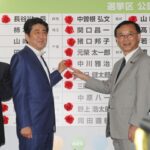Table of Contents
On May 12, 2025, the United States and China agreed to pause reciprocal tariffs for 90 days, signaling a temporary truce in a prolonged trade war that has shaken the global economy. While President Donald Trump framed his tariff policies as a bold step to reignite American manufacturing and protect workers, the reality is far less promising. Stock markets plunged, GDP shrank, and U.S. corporations slashed profit forecasts. The Trump administration now finds itself retreating—but without a real plan to fix what’s broken.
It’s becoming clearer by the day: Trade wars won’t save American workers. But going back to the old liberal globalist model—marked by deregulated markets, free capital flow, and corporate greed—won’t work either. What we need is not just reform, but a transformation of the global economic order.

The Collapse of the Liberal Globalist Illusion
The world economy has been shaped by the legacy of liberal globalization, driven largely by policies imposed by elites in the Global North. After World War II, the vision of inclusive growth through trade and labor protections started off with good intentions. But by the 1970s, that vision began to erode.
Economic elites in the United States and Britain, in response to inflation and stagnation, pushed back against strong unions, social welfare, and government regulations. By the 1980s, leaders like Ronald Reagan and Margaret Thatcher replaced public-oriented policies with aggressive privatization, tax cuts for the rich, and financial deregulation.
This shift paved the way for a profit-driven system: factories moved overseas, finance overtook manufacturing, and speculation became the main growth driver. American workers saw their wages stagnate, job security vanish, and living costs soar.
At the global level, institutions like the World Bank and IMF forced developing countries to privatize and cut public spending—without considering the social cost. What followed were the “lost decades” of the 1980s and 90s: soaring debt, rising inequality, and economic instability from Mexico to Russia.

Trump’s Illiberal Turn: Economic Populism without Substance
Trump’s economic populism promised to fix the broken system—but his strategy mirrors the same illiberal path that failed in parts of Europe. His tariffs and threats only deepened inflationary pressures at home and pushed China to become more self-reliant, strengthening its domestic industry and regional influence.
Unlike real industrial policy—which would involve coordinated public investment, sector-specific support, and protection of labor standards—Trump’s reactive trade measures lack depth. They offer no structural change and no sustainable plan for worker prosperity.
Even the promising industrial policies initiated under President Biden—such as the Inflation Reduction Act and CHIPS Act—are now under attack. Without them, workers face the same economic shocks, while the narrative of reindustrialization remains political theater.

The Real Solution: A New Economic Order
To truly serve workers and build economic resilience, the world needs more than superficial reforms. It needs a new global framework rooted in cooperation, equity, and sustainability.
Here’s what that looks like:
- Multilateral Governance: Countries must coordinate tax policies, regulate capital flows, and enforce labor and environmental standards together—not just compete for corporate favor.
- Ecological Development: Rich countries should adopt a post-growth model—focusing on quality of life, ecological stability, and redistribution instead of endless GDP expansion.
- Inclusive Global Investment: Emerging economies must have the space and tools to pursue their own industrial strategies, supported by long-term, green-focused public financing.
- Labor-Centered Growth: Investment in care work, green infrastructure, and strong public services should replace outdated growth models rooted in speculation and exploitation.
This new model would empower governments to create good jobs, support unions, and reduce inequality—goals that neither Trump’s tariffs nor neoliberal globalization have achieved.

The Way Forward: Vision Over Vengeance
We must stop reacting to economic crises with band-aid nationalism or nostalgic liberalism. The Trump administration’s retreat from its tariff war shows that economic populism without a plan leads nowhere. But simply rolling back to the old ways invites the same inequality and stagnation that fueled today’s discontent.
A bold, just, and future-focused global economy is possible—but it requires courageous leadership, coordinated global action, and unwavering commitment to human dignity over corporate profit. The future of American workers—and of economies worldwide—depends on it.
Author Profile

- Li Li, associate professor and master’s supervisor at Southwest University. B.A. in English for Education from Southwest Normal University, M.A. in English Translation and Interpretation from China Foreign Affairs University, Ph. D. in Japanese Cultural History from Nankai University (all above are in China). Also has studied at Osaka Sangyo University and Kokugakuin University in Japan and been a Fulbright visiting scholar to Western Kentucky University in US. A multidisciplinary and versatile instructor with a trilingual mastery of Chinese, English and Japanese, known for Combining foreign language teaching with history and humanity cultivation. Academic researches center on Japanese history, international relations and Western culture studies. Work experiences include teaching at Capital Normal University, Chongqing Normal University, and Southwest University. Has published multiple academic papers, translated works, authored or co-edited several textbooks and monographs; provided language services for several high-level and high-profile international events.
Latest entries
 GeopoliticsAugust 22, 2025The Limits of Russia’s Friendship: Moscow’s Calculated Response to the Iran Crisis
GeopoliticsAugust 22, 2025The Limits of Russia’s Friendship: Moscow’s Calculated Response to the Iran Crisis Japanese PoliticsJuly 22, 2025Japan’s Upper House Election: Prolonged Instability and Its Impact on Domestic and Foreign Policy
Japanese PoliticsJuly 22, 2025Japan’s Upper House Election: Prolonged Instability and Its Impact on Domestic and Foreign Policy Middle East AffairsJuly 20, 2025Will Israel Ever Face Consequences for Bombing Its Neighbours?
Middle East AffairsJuly 20, 2025Will Israel Ever Face Consequences for Bombing Its Neighbours? Energy & ClimateJuly 13, 2025Iran Conflict: Four Lessons Learned for the Oil Market
Energy & ClimateJuly 13, 2025Iran Conflict: Four Lessons Learned for the Oil Market


1 comment
I just binged your latest posts, and wow—your storytelling is next level! Can’t wait to read more. 📖❤️